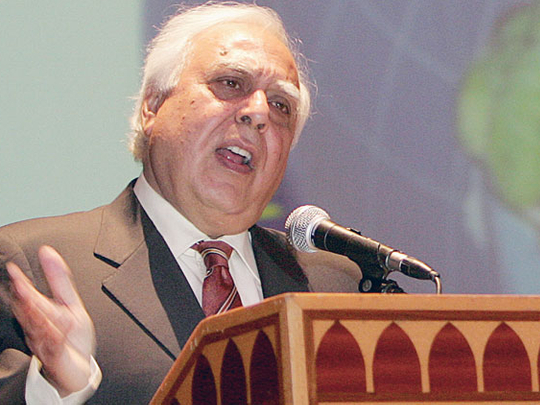
Dubai: The Central Board of Secondary Examination (CBSE) has launched its international curriculum to facilitate a globally recognised education system to the Indian diaspora across the world.
The CBSE International (CBSE I) was officially launched in Dubai on Tuesday by Kapil Sibal, Indian Union minister for Human Resources Development, at The Indian High School in Dubai.
The CBSE I will be implemented in grade 1 and grade 9 in 30 schools in the first phase. The UAE, Oman, Saudi Arabia, Qatar, Singapore, Malaysia and Japan are among the nine countries that are first to adopt the new curriculum. In the UAE, 13 schools have already implemented the CBSE I curriculum from this April.
Vineeth Joshi, the chairman of CBSE board, said the CBSE I is an internationally bench-marked curriculum, which is enquiry and skill-based catering to individual learning styles.
"The curriculum provides opportunity for extended learning and help develop perspectives, with emphasis on research orientation and social empowerment," he said.
Key subjects like science, math and social studies will have a new learning approach, he added. "Math will have two segments — higher and lower, which students can choose from according their calibre. Social studies will be globalised but incorporating locally relevant components depending on where the school is located, and science will add an enrichment component. Visual and performance arts will also be treated more liberally," said Joshi.
Huge step
Speaking at the launch ceremony, Sibal said CBSE I is a small step for India but a huge step for education. "With the internet revolution, there are no more boundary restrictions in the transfer of date or knowledge. But apart from the transfer of data, very little interaction [between] people is happening. In this world, we need to collaborate; we need to internationalise our curriculum. Through that process of education, we will have a more peaceful, tolerant diverse and unified world. That is the real aim of education."
Later at a press conference held at the school, Sibal said the CBSE I is open for students of non-Indian origin too. "We are looking at both foreign and Indian students. I do not think any choice should be limited to one nationality," he said.
A leading lawyer at the Supreme Court of India before joining politics, Sibal said children should realise that the goal of education is not to understand complex mathematical problems, but to prepare them to face challenges out in the world.
"Children must realise that two plus two must be four in the classroom. But outside the classroom, it may not be so. Formulas of life are more complicated and in that sense we need a globalised community that understands the complexities outside the classroom," he said.
The minister also unveiled the new CBSE I portal and officially opened the e-learning programme in the Indian High School. A professional training programme was also initiated for 180 teachers from 30 schools.
The ceremony was attended by Indian ambassador, M.K. Lokesh, Consul General, Sanjay Verma, Dr Abdullah Karam, Head of KHDA, Mohan Valrani, Board of Chairman of Indian high School and other dignitaries.
Asok Kumar, CEO of the Indian high School, said his school now has a mixed model wherein students can choose between the existing or the international curriculum. "We have begun with grade 1 and 9 and will roll over to the new system gradually while retaining the Indian curriculum."












